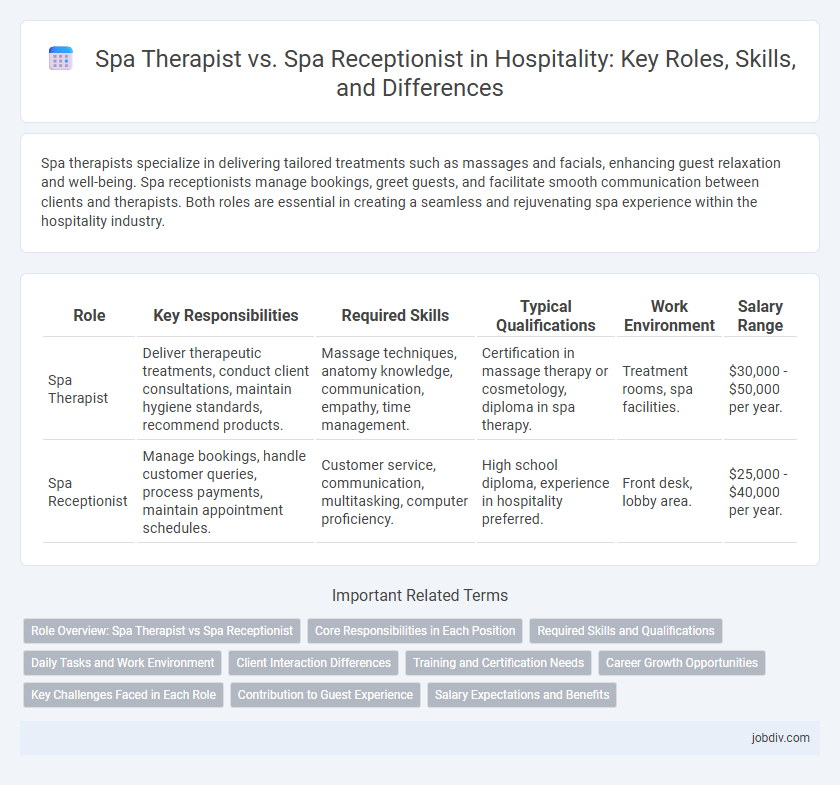Spa therapists specialize in delivering tailored treatments such as massages and facials, enhancing guest relaxation and well-being. Spa receptionists manage bookings, greet guests, and facilitate smooth communication between clients and therapists. Both roles are essential in creating a seamless and rejuvenating spa experience within the hospitality industry.
Table of Comparison
| Role | Key Responsibilities | Required Skills | Typical Qualifications | Work Environment | Salary Range |
|---|---|---|---|---|---|
| Spa Therapist | Deliver therapeutic treatments, conduct client consultations, maintain hygiene standards, recommend products. | Massage techniques, anatomy knowledge, communication, empathy, time management. | Certification in massage therapy or cosmetology, diploma in spa therapy. | Treatment rooms, spa facilities. | $30,000 - $50,000 per year. |
| Spa Receptionist | Manage bookings, handle customer queries, process payments, maintain appointment schedules. | Customer service, communication, multitasking, computer proficiency. | High school diploma, experience in hospitality preferred. | Front desk, lobby area. | $25,000 - $40,000 per year. |
Role Overview: Spa Therapist vs Spa Receptionist
Spa therapists provide personalized treatments like massages, facials, and body therapies to enhance client well-being and ensure relaxation. Spa receptionists manage booking appointments, greet guests, handle billing, and coordinate between clients and therapists to maintain smooth operations. Both roles are essential in delivering a seamless, high-quality spa experience focused on customer satisfaction and wellness services.
Core Responsibilities in Each Position
Spa Therapists specialize in delivering personalized treatments such as massages, facials, and body therapies, ensuring client relaxation and wellness through expert technique and product knowledge. Spa Receptionists manage appointment scheduling, client check-ins, and handle inquiries, playing a critical role in customer service and smooth operational flow. Both positions require strong communication skills, but Spa Therapists focus on hands-on care while Spa Receptionists emphasize administrative efficiency.
Required Skills and Qualifications
Spa therapists require in-depth knowledge of anatomy, massage techniques, and skincare treatments, often supported by certifications in specialized therapies such as aromatherapy or reflexology. Spa receptionists must possess strong communication skills, proficiency in booking systems, and customer service experience to manage appointments and client interactions efficiently. Both roles demand a professional demeanor and the ability to maintain client confidentiality within a luxury spa environment.
Daily Tasks and Work Environment
Spa therapists perform treatments such as massages, facials, and body wraps, requiring specialized skills and direct client interaction in a tranquil, well-equipped environment. Spa receptionists manage booking schedules, handle customer inquiries, process payments, and maintain front-desk organization within a fast-paced and customer-focused setting. Both roles contribute to guest satisfaction but differ significantly in job functions and workplace atmosphere.
Client Interaction Differences
Spa therapists engage directly with clients through personalized treatments, assessing individual needs and providing tailored wellness experiences. Spa receptionists manage initial client interactions, including appointment scheduling, greeting guests, and handling inquiries to ensure a smooth and welcoming visit. The therapist's role centers on delivering hands-on services, while the receptionist focuses on administrative support and customer service.
Training and Certification Needs
Spa therapists require extensive training in anatomy, physiology, massage techniques, and specialized treatments, often culminating in certifications such as Licensed Massage Therapist (LMT) or Certified Spa Therapist (CST). Spa receptionists focus on customer service skills, appointment scheduling software proficiency, and basic knowledge of spa services, typically needing certifications in front desk management or hospitality operations. Both roles demand ongoing professional development, but spa therapists require more specialized and formalized education to ensure therapeutic safety and efficacy.
Career Growth Opportunities
Spa therapists benefit from specialized skill development and certifications that open pathways to advanced roles such as spa manager or wellness consultant. Spa receptionists acquire strong administrative and customer service expertise, with opportunities to progress to front office manager or guest relations supervisor. Career growth for spa therapists typically centers on clinical and treatment proficiency, while receptionists expand into operational and management functions within hospitality settings.
Key Challenges Faced in Each Role
Spa therapists face key challenges such as managing diverse client needs, maintaining high hygiene standards, and ensuring consistent treatment quality under pressure. Spa receptionists struggle with balancing appointment scheduling, handling customer inquiries, and managing walk-ins while maintaining a welcoming atmosphere. Both roles demand excellent communication skills and the ability to multitask effectively in a fast-paced environment.
Contribution to Guest Experience
Spa therapists enhance guest experience by delivering personalized treatments that promote relaxation and well-being, directly impacting customer satisfaction. Spa receptionists contribute by managing bookings, greeting guests warmly, and ensuring smooth check-in processes, creating a welcoming atmosphere. Both roles are essential in maintaining high service standards and fostering positive guest interactions within hospitality settings.
Salary Expectations and Benefits
Spa therapists typically earn higher salaries than spa receptionists due to their specialized skills in massage and wellness treatments, with average annual incomes ranging from $35,000 to $50,000 compared to $25,000 to $35,000 for receptionists. Benefits for spa therapists often include health insurance, paid training for advanced techniques, and performance bonuses reflecting client satisfaction and treatment effectiveness. In contrast, spa receptionists usually receive standard employee benefits such as health coverage, flexible scheduling, and employee discounts, but with fewer opportunities for bonuses or professional development incentives.
Spa Therapist vs Spa Receptionist Infographic

 jobdiv.com
jobdiv.com